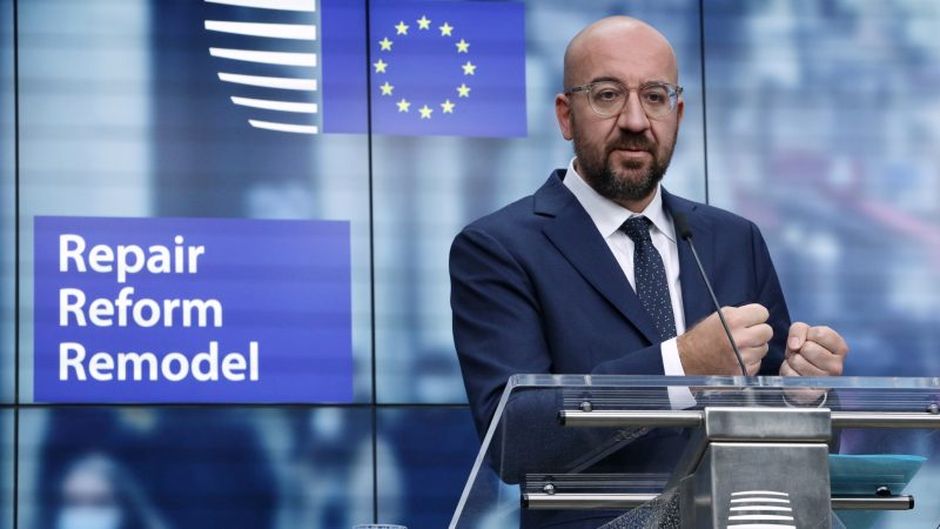Italy and Spain will be the main recipients of the grants. The biggest joint borrowing ever agreed by the EU came after almost five days of tense talks.
 European Council President, Charles Michel. / @EUCouncil
European Council President, Charles Michel. / @EUCouncil
European Union leaders reached a deal on a €750 billion, to help member states recover from the coronavirus crisis.
After almost five days of tense talks, they agreed on a package, which is is the biggest joint borrowing ever agreed by the EU.
It includes €390 billion in grants to the countries hardest hit by the pandemic, a lower figure than the initial €500-billion grant proposal made by France and Germany, and €360 billion in low-interest loans, repayable by the receiving member state.
European Council President Charles Michel tweeted a short message minutes after the agreement, at about 05:15 am, just saying: “Deal!”
“We did it. Europe is strong, Europe is united. This is a good deal, this is a strong deal and most importantly this is the right deal for Europe right now. I believe this agreement will be seen as a pivotal moment for Europe's journey”, he added.
The European Commission President Ursula von der Leyen , pointed out that “Europe as a whole has now a big change to come out stronger from the crisis. Today we have taken a historic step that we can all be proud of. Tonight is a big step toward recovery”.
She also waned in twitter that “Other important steps remain. First and most important: to gain the support of the European Parliament. Nobody should take our European Union for granted”.
The commission also agreed to a core budget of € 1.1 trillion from 2021-2027.
Most of the grants will go to the Italy and Spain, the most devastated by the pandemic. It is expected that Italy will receive €209 billion, €81 billion in grants and €127 billion in loans.
Meanwhile, the EU will give €140 billion to Spain over the next six years, €72.7 billion in grants and the rest in loans, which makes Spain the second biggest recipient after Italy.
“We are satisfied with the approval of an ambitious relaunch plan, which will allow us to confront the crisis with strength and effectiveness”, Italian Prime Minister Giuseppe Conte said.
Spanish President, Pedro Sanchez stressed that “it is a great agreement for Europe, it is a great agreement for Spain. The agenda of the European Union and the agenda of Spain are in absolute synchrony”.
Greece will also receive €72 billion under the plan, in a move that Prime Minister Kyriakos Mitsotakis defined a “national success”.
German Chancellor Angela Merkel and French President Emmanuel Macron held a joint press conference after the deal, where the German leader said that she was “happy and relieved” for the agreement.
“That was not easy that we needed so many days, it showed also that we came from different directions. But what counts for me is that we ended up getting it together and that we are now all convinced of what we decided to do”, Merkel added.
According to Macron, the agreement is “a historic change of our Europe and eurozone. I want everyone to measure the distance travelled in two months. There is no such thing as a perfect world, but we have made progress”.
The so-called “frugal countries”, Austria, Denmark, the Netherlands and Sweden, had strongly opposed the idea of taking on debt to issue recovery grants, so that, for much of the summit, they fought to reduce the portion of grants in favor of loans.
Prime Minister of the Netherlands Mark Rutte, said “I wouldn’t use the term historic to describe this moment”, but he praised that it gives the Netherlands the possibility to "trigger an emergency brake" on payments if it thinks a government hasn't fulfilled its reform promises.
“After four days of negotiations we were able to reach a good result for the EU and Austria on the MFF and the Recovery Instrument. Thank you to all colleagues, especially to the frugals!”, Chancellor of Austria Sebastian Kurz, tweeted Tuesday morning.

Las opiniones vertidas por nuestros colaboradores se realizan a nivel personal, pudiendo coincidir o no con la postura de la dirección de Protestante Digital.
Si quieres comentar o